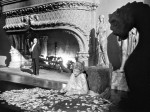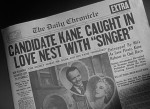 There must be some weird spinning noises coming from the Hearst mausoleum at Cypress Lawn Cemetery in Colma, California, because for the first time ever, Citizen Kane, Orson Welles’ greatest masterpiece and William Randolph Hearst’s noirest bête noir, will be screened at Hearst Castle. It will be shown in the castle’s private theater on March 13th as part of the San Luis Obispo International Film Festival. The theater seats 50 people and tickets cost $1,000 a head, with all proceeds benefiting the film festival and The Friends of Hearst Castle, a nonprofit dedicated to the preservation of the property and its contents. The screening at Hearst Castle will be introduced by Ben Mankiewicz, grandson of Citizen Kane screenwriter Herman Mankiewicz and my second-favorite Turner Classic Movies host. (Robert Osborne 4ever!)
There must be some weird spinning noises coming from the Hearst mausoleum at Cypress Lawn Cemetery in Colma, California, because for the first time ever, Citizen Kane, Orson Welles’ greatest masterpiece and William Randolph Hearst’s noirest bête noir, will be screened at Hearst Castle. It will be shown in the castle’s private theater on March 13th as part of the San Luis Obispo International Film Festival. The theater seats 50 people and tickets cost $1,000 a head, with all proceeds benefiting the film festival and The Friends of Hearst Castle, a nonprofit dedicated to the preservation of the property and its contents. The screening at Hearst Castle will be introduced by Ben Mankiewicz, grandson of Citizen Kane screenwriter Herman Mankiewicz and my second-favorite Turner Classic Movies host. (Robert Osborne 4ever!)
The ice was broken in 2012 when Stephen Thompson Hearst, William Randolph’s great-grandson and vice president of the Hearst Corporation’s Western Properties, allowed the first showing of the film at the visitors center two miles from the castle. This time it will be screened in the castle itself, the lavish residence that so loomingly features in Citizen Kane as Xanadu.
 The depiction of the opulent, art-crammed, oppressive castle didn’t please William Randolph Hearst, but that wasn’t the main reason he hated Citizen Kane so much. It was the character of Susan Alexander, Charles Foster Kane’s mistress and second wife, who offended Hearst the most. She was widely thought to have been based on Marion Davies, the silent film comedienne and Hearst’s mistress of more than 30 years. Her depiction as a talentless, bitter, lonely drunk imprisoned by her husband in the vast mausoleum of Xanadu was deeply insulting to Hearst, and since Marion was in fact a very popular hostess with tons of friends in the Hollywood community, it earned Citizen Kane an indelible reputation for churlishness before the first showing.
The depiction of the opulent, art-crammed, oppressive castle didn’t please William Randolph Hearst, but that wasn’t the main reason he hated Citizen Kane so much. It was the character of Susan Alexander, Charles Foster Kane’s mistress and second wife, who offended Hearst the most. She was widely thought to have been based on Marion Davies, the silent film comedienne and Hearst’s mistress of more than 30 years. Her depiction as a talentless, bitter, lonely drunk imprisoned by her husband in the vast mausoleum of Xanadu was deeply insulting to Hearst, and since Marion was in fact a very popular hostess with tons of friends in the Hollywood community, it earned Citizen Kane an indelible reputation for churlishness before the first showing.
Welles’ insistence that Susan Alexander was actually modeled after an entirely different mistress of an entirely different tycoon made little impression, nor did his insistence that the character of Charles Foster Kane wasn’t modeled after Hearst. There were many points of similarity in the biographies of Kane and Hearst, and bits of several of Hearst’s speeches wound up in Kane’s speeches. Hearst’s avid acquisition of art, including entire rooms exported from grand European historical structures, as well as real estate was also mimicked by Kane.
Welles knew from the time he and former journalist Herman Mankiewicz wrote the screenplay that Hearst would be on him like white on rice over this story, but because he had an unprecedented carte blanche contract with film studio RKO that allowed him complete creative control and final cut, he figured he could just brazen his way through Hearst’s opposition. He was wrong. The movie wasn’t even finished when Hearst’s campaign began. He had gotten an early look at the screenplay, and when gossip columnist Hedda Hopper caught an early screening of the incomplete movie on January 3rd, 1941, she went straight to Hearst with the poop.
 Hearst turned his Great Lidless Eye onto Citizen Kane and stared it all the way down. He deployed his newspapers, read by one in five Americans, to expose Welles’ personal and political peccadilloes. Mankiewicz’s DUI arrest got column inches too (although not the part about his acquittal on all charges). Influential Hearst gossip columnist Louella Parsons dressed Welles down repeatedly, mocking him as a “would-be genius” and portraying him as a New York brat swanning around the movie colony with barely disguised contempt. And that was the relatively clean game. Hearst also played dirty, securing the terrified support of studios by threatening to publish all the scabrous stories about their stars he had killed at their request. He also threatened to turn the harsh glare of his papers on something studio heads were even more desperate to keep quiet: how many of them were Jews, and German Jews at that.
Hearst turned his Great Lidless Eye onto Citizen Kane and stared it all the way down. He deployed his newspapers, read by one in five Americans, to expose Welles’ personal and political peccadilloes. Mankiewicz’s DUI arrest got column inches too (although not the part about his acquittal on all charges). Influential Hearst gossip columnist Louella Parsons dressed Welles down repeatedly, mocking him as a “would-be genius” and portraying him as a New York brat swanning around the movie colony with barely disguised contempt. And that was the relatively clean game. Hearst also played dirty, securing the terrified support of studios by threatening to publish all the scabrous stories about their stars he had killed at their request. He also threatened to turn the harsh glare of his papers on something studio heads were even more desperate to keep quiet: how many of them were Jews, and German Jews at that.
Led by Louis B. Mayer, the studio brass passed around the collection plate and offered RKO $800,000 to buy the negative so they could burn it. The movie’s financial backers had a private screening at Radio City Music Hall that all the movie industry big shots attended in the hope they could persuade the shelving of the film for the good of the “industry.” Orson Welles gave a rousing speech at the event, extolling the virtues of free speech in a world increasingly threatened by tyranny. It was enough to keep the negative out of the bonfire, but it wasn’t enough to beat Hearst.
 Hearst’s next target was movie theaters. He told the theater chains that if they showed Citizen Kane, he would never allow them to advertise any other movies in one of his newspapers. That was brutally effective. Most theaters refused to show it. New York was the only place where it was widely seen, and it was showered with awards. At the 1942 Academy Awards, on the other hand, where Citizen Kane was nominated for nine awards, every time a nominee was mentioned there was booing in the audience. The movie did manage to win one Oscar for best screenplay, shared by Welles and Mankiewicz.
Hearst’s next target was movie theaters. He told the theater chains that if they showed Citizen Kane, he would never allow them to advertise any other movies in one of his newspapers. That was brutally effective. Most theaters refused to show it. New York was the only place where it was widely seen, and it was showered with awards. At the 1942 Academy Awards, on the other hand, where Citizen Kane was nominated for nine awards, every time a nominee was mentioned there was booing in the audience. The movie did manage to win one Oscar for best screenplay, shared by Welles and Mankiewicz.
After all this mess, RKO put the film in the vault and left it there gathering dust for years. Citizen Kane came out of obscurity in 1956 when RKO sold its catalogue to television, the first studio to do so, and by the end of the decade it began its reign at the top of greatest movies of all time lists.
All this drama was water under the bridge, as far as Steve Hearst was concerned. He has seen the movie repeatedly, the first time in junior high, so he hadn’t inherited his great-grandfather’s sensitivity to the subject matter.
Hearst recalled that he first saw “Kane” at school as a seventh grader when he was 11 and was told by his parents that it wasn’t accurate depiction. He’s seen it five other times and believes that it gives the incorrect impression on two fronts — Davies being portrayed as talent-free (“That was a pretty sharp blade”) and Xanadu being a dark, forbidding locale (“It’s where I had fun in the summer, swimming in the Neptune pool”).
Yes I bet you did have fun swimming in the Neptune Pool.
A few years ago HBO made a movie, RKO 281, about the battle between Hearst and Welles over Citizen Kane. The actors are all top-notch (James Cromwell makes a remarkably sympathetic Hearst even with all his control freakery), but the story is fictionalized in key points. It’s only available on DVD, although you can watch a crappy pixellated version with Portuguese subtitles on YouTube.
For the non-fiction version, PBS’ always excellent American Experience dedicated an episode to The Battle Over Citizen Kane. It debuted years ago and it’s not available to watch online on the PBS website. It is on YouTube, but only split up into 12 10-minute videos. That’s a bit too much embedding even for me, so I’ll just get you hooked on the first dose.
[youtube=http://youtu.be/rR2s6_Xbi9M&w=430]